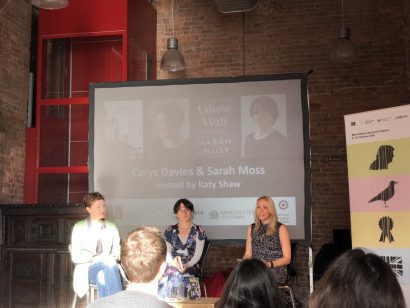 MLF Chapter & Verse
MLF Chapter & Verse
The Manchester Literature Festival Blog
Review: Carys Davies and Sarah Moss
Centre for New Writing student Matthew McGrogan hears about the breaking of boundaries at our event with Carys Davies and Sarah Moss.
The sun emerged from behind the clouds as Katy Shaw welcomed Carys Davies and Sarah Moss to the International Burgess Foundation. Both novelists have recently celebrated the release of a new book — Carys Davies with her debut novel West and Sarah Moss with her novel Ghost Wall.
Katy began by mentioning the form of both novels. She asked if the writers made a conscious decision to write a concise novel. Carys said it was not a decision she made before writing, and highlighted her background and familiarity with short stories as a potential reason for the length of West. For her, the “spaces on the page” are an important factor in crafting a narrative. She also mentioned some of her favourite books being short, such as So Long, See You Tomorrow by William Maxwell. Sarah Moss shared these views, stating that she “didn’t set out” to write a short novel.
Both novelists were mentioning their works — so Katy suggested a reading. Both were profound and gripping, with concise and striking language. Sarah said that the start of her novel is ‘disturbing’ and chose to read from the middle of the novel, which featured a strong female narrative voice.
Katy suggested that both authors had extensive research phases during the writing process. Carys stated that she ‘actually wrote it without any research’ — much to the amusement of the audience. She went on a three month trip to North America, immersing herself in the setting of West, but had no structured research besides reading some tribal speeches made by Natives from the 19th Century. Sarah had a similar experience researching for Ghost Wall. She made several trips to Northumberland, spending time near Hadrian’s Wall. She said that “at the time, Donald Trump was making several mentions of his wall.” At this point, the electronic curtain drew across the window and shut out the late afternoon sun, and the room went dark — an ominous coincidence. She said that the politics of the time “made her think about walls and boundaries”, and the displacing effects they have on people’s lives.
The conversation moved to discuss the female voices in West and Ghost Wall, prominently featuring in both novels. Katy asked the writers if their characters are both victims of “regressive fantasy of male masculinity”. Carys suggests that some are — but that the issue is more complex. She states that it is a “class issue”, and highlights the gothic elements within her work. She laughed as she recalls the story of a review of her book, which suggested that “two male predators in one book was one too many”. She also mentions that she did not plan to use such a strong female voice, and she only got a “sense of who the character was part way through” the writing of her novel. Sarah, conversely, said she knew exactly who the characters were before she set out to write the novel — one of the few times the two disagreed during the conversation. Sarah agreed on the gothic elements present in her novel. She suggested that the gothic engages with the idea of social transgression and allowed “modes of expression” that were not normal.
The conversation concluded with a question from the audience. A man asked if there was any “one thing that led to the writing of the novels”. Carys was “electrified” by the idea of being inside someone’s head who believed in myth and took it upon themselves to search for truth. Sarah again highlighted the experience at Hadrian’s Wall, and the notion of social boundaries present within society. This was a theme throughout the event — both authors mentioning the potential for the novel as a medium to provoke thoughts on the state of society and how boundaries and walls can be identified and broken down.
